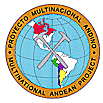
 |
MAP NEWS |
|
Upcoming Activities Aravena to Chile (D.96/C-14) Dr. Ramon Aravena of University of Waterloo, Ontario will be travelling to Chile in August to continue work with SERNAGEOMIN scientists on the hydrogeology program. Geosoft Training in Peru (D.98/P-1) From September 4 to 8 and October 4 to 6 of this year scientists with INGEMMET, Peru will receive introductory training on Geosoft software donated to the institution by MAP. MAP Executive Council Meetings Date Change (PM.00/M-3) Due to the change in date of the MAP Symposium at the IX Chilean Geological Congress in Puerto Varas, Chile to August 1, 2000 it has been decided to move the MAP Executive Council Meetings ahead by one day. The new dates for the Executive Council meetings will be from Wednesday August 2 to Friday, August 4, 2000. Suggested Agenda Items: · Draft Metallogenic Map Please forward agenda suggestions to Mike Ellerbeck Activity Reports Metallogenic Map Update Dr. Eduardo Zappettini visited GSC Vancouver during the week of June 12 though 16. The MAP metallogenic map coordinator Dr. Eduardo Zappettini, SEGEMAR, Argentina was in Vancouver to work with Mr. Rob Cocking of the GSC Vancouver Geographical Information System (GIS) group. Working with digital data from each of the MAP participants, they were able to construct the first draft of the metallogenic map to be displayed at the IX Chilean Geological Congress in Puerto Varas, Chile, July 31 to August 4, 2000. Currently the GSC GIS group is updating the draft metallogenic map with the final additions to the database to have it ready for the Congress. Bolivian Scanner Repair The SERGEOMIN scanner sent to Vancouver for repair in April should be repaired and ready for testing by the end of July. The scanner will remain at GSC Vancouver for a short time to undergo extensive testing before being returned to Bolivia. Airborne Surveys
Chile / Argentina The Chile / Argentina airborne geophysical survey which commenced in April 2000 is temporarily on hold to await improvement in weather conditions in the region. It is anticipated that the survey will resume next December or January. Bolivia / Chile / Peru The contract for the Bolivia / Chile / Peru airborne geophysical survey was granted to the winning contractor SIAL Geoscience of Montreal in June. Currently, MAP management along with Dr. Dennis Teskey (Technical Supervisor for the Survey) and the survey participants are working out the final details before the commencement of the survey which is anticipated to occur as soon as the contractor is able to set up a base of operation and obtain all required permits from local authorities, but flying is weather dependent. Peruvian Consulate General Velasquez to Return to Peru MAP Fellowship fund As the MAP Symposium at the IX Chilean Geological Congress in Puerto Varas, Chile is approaching quickly, it is urged that countries wishing to use the MAP Fellowship fund to sponsor participants from their institution to attend and present at the symposium send in a formal request to the Project Manager, Dr. Catherine Hickson at GSC, Vancouver and to MAP Technical Advisor, Dr. Constantino Mpodozis, SERNAGEOMIN, Chile no later than July 15, 2000 in order to leave time for assessment of the applications. PIMA to Chile Following the success of the Portable Infrared Mineral Analyser (PIMA) course in Chile May 22 to 26, 2000 in which 13 scientists from SERNAGEOMIN participated, the MAP PIMA will be sent to Chile for field use for six months commencing in August. MAP Sample Standards The current status of the MAP Standard Geochemical Reference Materials Project will be featured in a poster at the MAP Symposium in Chile in August. It will include a summary of the laboratory procedures involved in the making of custom geochemical reference materials, and a description of their uses, as well as display geochemical data and photographs of the samples evaluated and chosen so far for the project. The first set of sample bottles (Chilean andesite reference material) is expected to be distributed at that time, currently being produced at the Ontario Ministry of Northern Development and Mines Geoscience Laboratories in Sudbury, Ontario, Canada. The second set of standards, Argentinian basalt, should be completed and ready to distribute in early September. A rhyolitic rock from Peru has been submitted for evaluation as a sample standard, and further dacitic samples from Bolivia are being considered. It is expected that a second Chilean andesite will be chosen to represent a different range of composition. Thanks to all of the participating countries for the great amount of effort and cooperation that this project requires. MAP Sample Update New Samples Arrive in Vancouver Geological fieldwork in Peru, following the Volcanology Short Course held in Lima, has resulted in 42 pails of rock samples shipped to GSC Vancouver to be sent out for a combination of analyses, including evaluation of a rhyolitic sample standard, as well as 40 samples for radiometric dating (mostly Ar-Ar, and some K-Ar), whole rock and trace petrochemistry, and petrographic description. MAP Sample Database (B.98/M-1)
CAMMA
Ministers and senior mining officials from the Americas and the Caribbean, CAMMA (The Annual Conference of Mines Ministries of the Americas) will meet in Vancouver October 5th and 6th. This year discussion will center around sustainable development mining policies related to: Mining and the Environment; Mining and Communities; Market Access for Minerals and Metals For further information please contact the CAMMA Coordinating Committee contact parties for each of the "sub-regions" within CAMMA, on the website: |